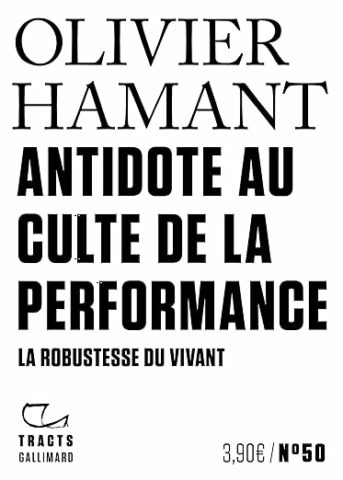What can we learn from the robustness of living organisms?
Our day-to-day lives are marked by socio-economic crises, and the only thing we can be sure of is that even more uncertainty lies ahead! How do we react? By trying to control, measure and optimize everything in our power! But do you really think that’s the best approach?
Olivier Hamant is a biologist who specializes in plant life, and he suggests there’s another way to face the ever-changing world of tomorrow. The director of the Michel Serres Institute argues that we should take our cue from living systems, nurturing our robustness and going against the never-ending quest for performance.

Antidote au culte de la performance : La robustesse du vivant,
By Olivier Hamant, Tracts Gallimard, 2023 and La troisième voie du vivant by Olivier Hamant, Odile Jacob, 2022.
I – Lethal performance
Back in 1972 the Meadows Report predicted that the planet would reach a socio-economic tipping point during the first half of the 21st century. The authors also highlighted the danger of exponential growth in a world of finite resources. Half a century after The Limits to Growth was first published, it’s now evident that the report has lost none of its force – quite the opposite: what was once a forecast far into the future has now become a burning issue.
Predictions made for 50 years ahead are out of date in double-quick time, and the future has become an outmoded concept. We are living in an unruly, confusing world that could at any moment set off massive social, ecological and geopolitical crises without warning. It’s a frightening prospect, there’s no denying it.
And when we’re fearful, our first instinct is to hang on to our most deeply held beliefs: today, that would be myths about performance and growth.
Not convinced? Then just take a look at our reaction to climate change. There’s green growth, smart cities, sustainable development, the transition… Yet not one of these concepts seriously challenges the exhortation to be more productive. In fact, even now they’re legitimizing the pursuit of performance, presenting it as a race for optimization, largely via productivity gains and greater efficiency. There are so many possibilities that could work in a stable world blessed with abundant resources. But they end up going nowhere, and even prove counter-productive in a fluctuating environment that is also experiencing severe shortages of some raw materials.
Our attempts to optimize often trigger a substantial rebound effect. We’re inventing alternative solutions with the focus on cutting energy consumption and GHG emissions. But these workarounds are more efficient, which means they’re more attractive, which means they’re used more widely – and may even create needs we didn’t previously have.
Ultimately, our behavior is leading to a global increase in greenhouse gas emissions and is eating up more resources. And then we also need to consider the implications of reductionism: we’re so wrapped up in one problem (decarbonization, for instance) that we create other problems elsewhere: we’re destroying biodiversity, using up scare resources, generating pollution and eroding working conditions.
© Copyright Business Digest - All rights reserved




